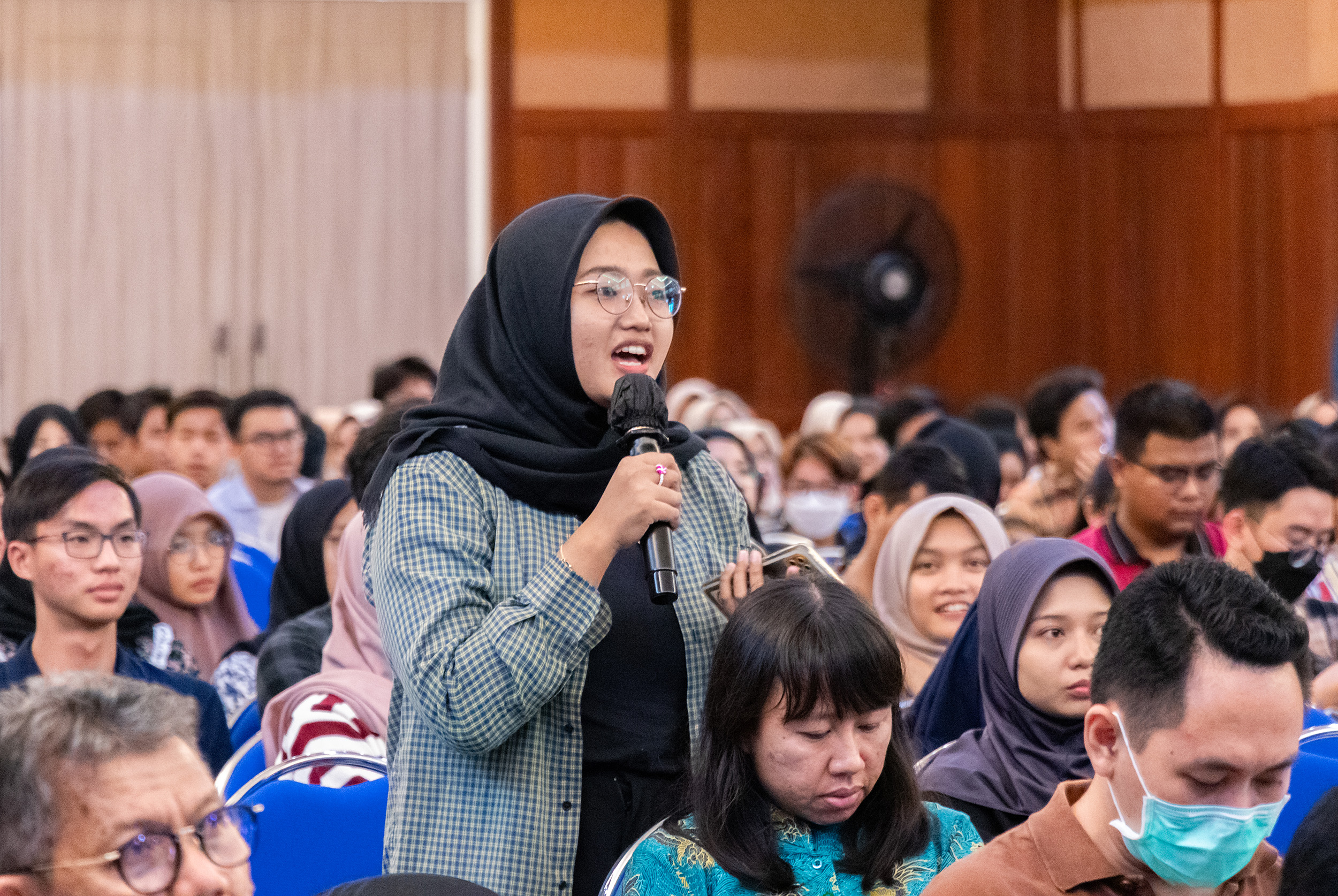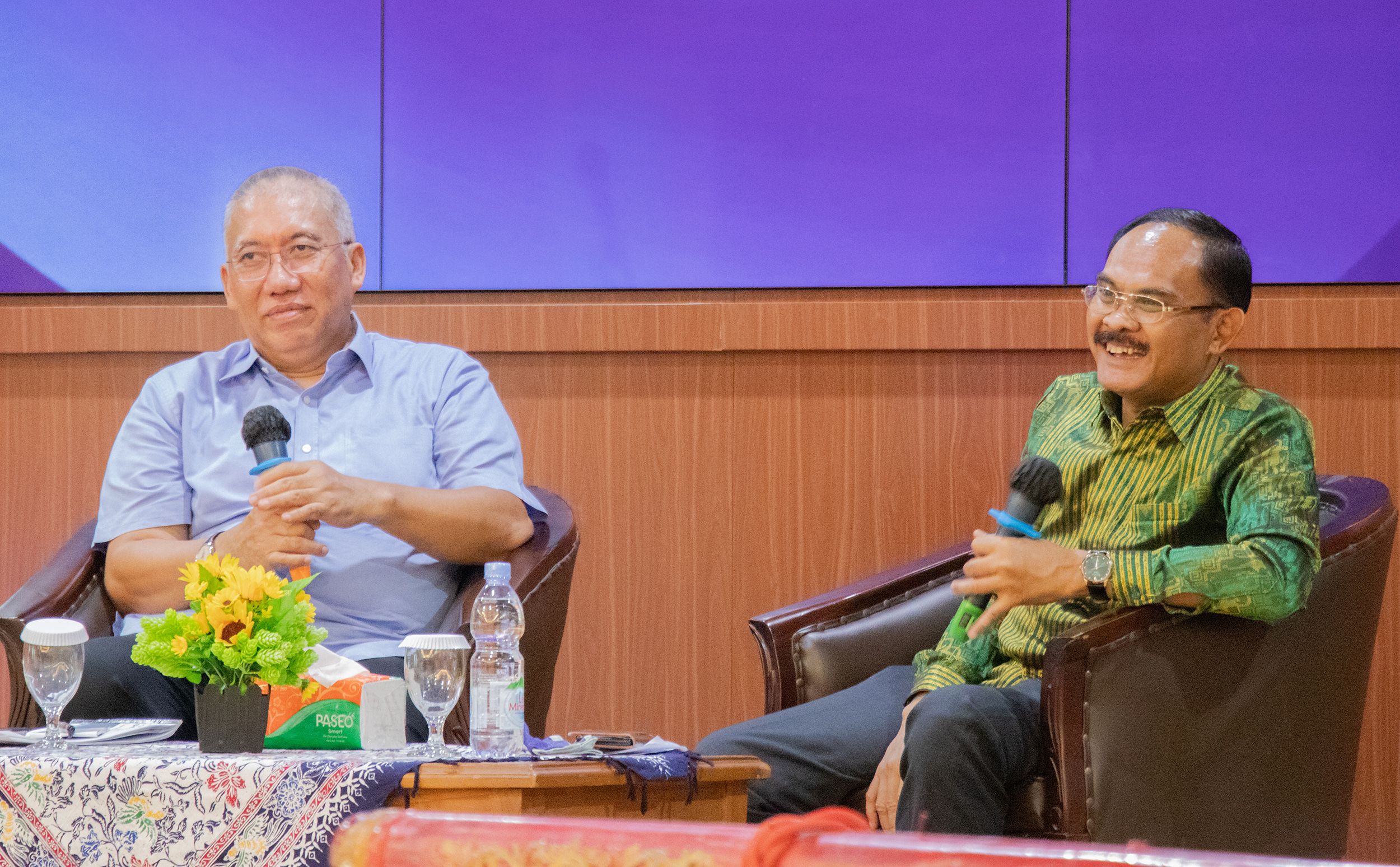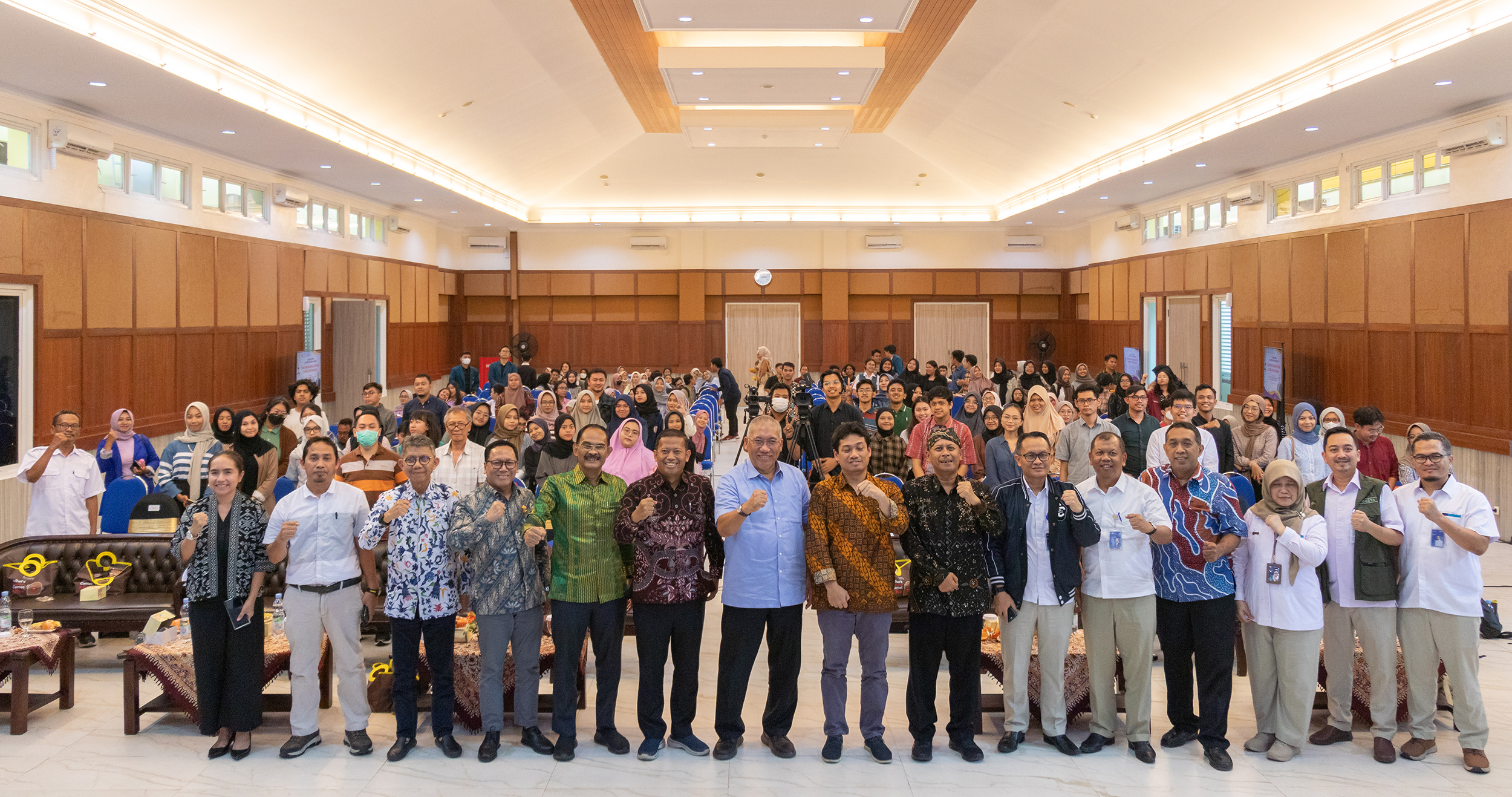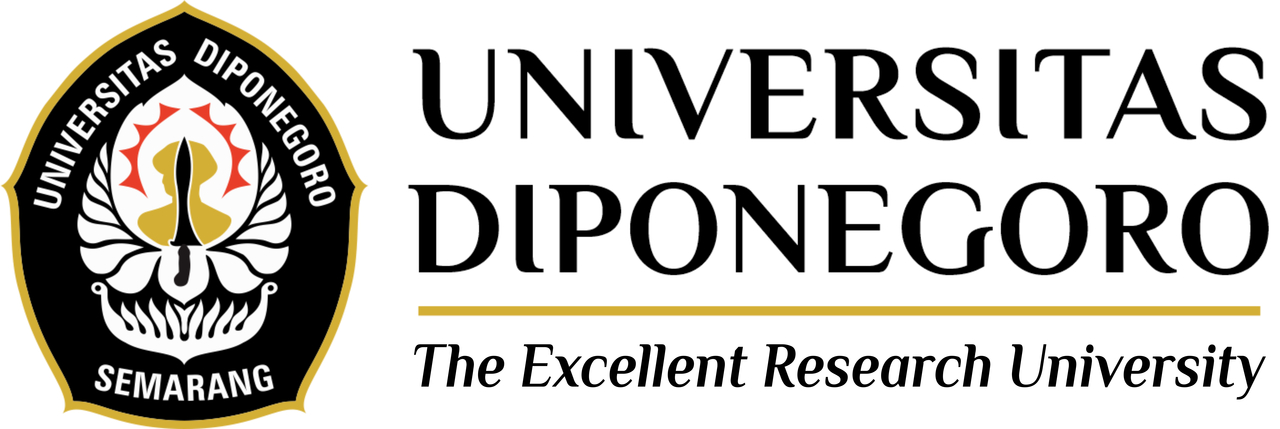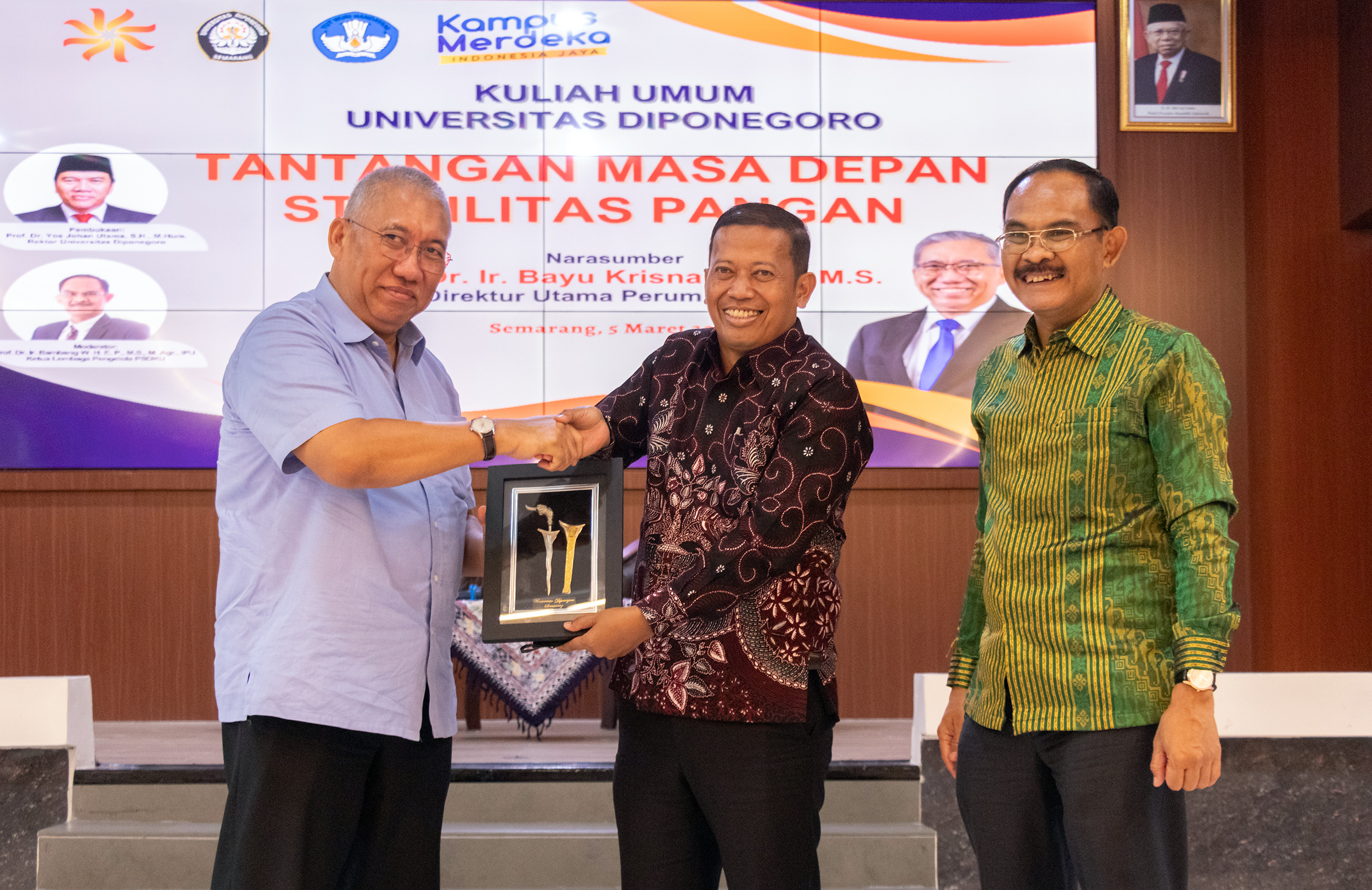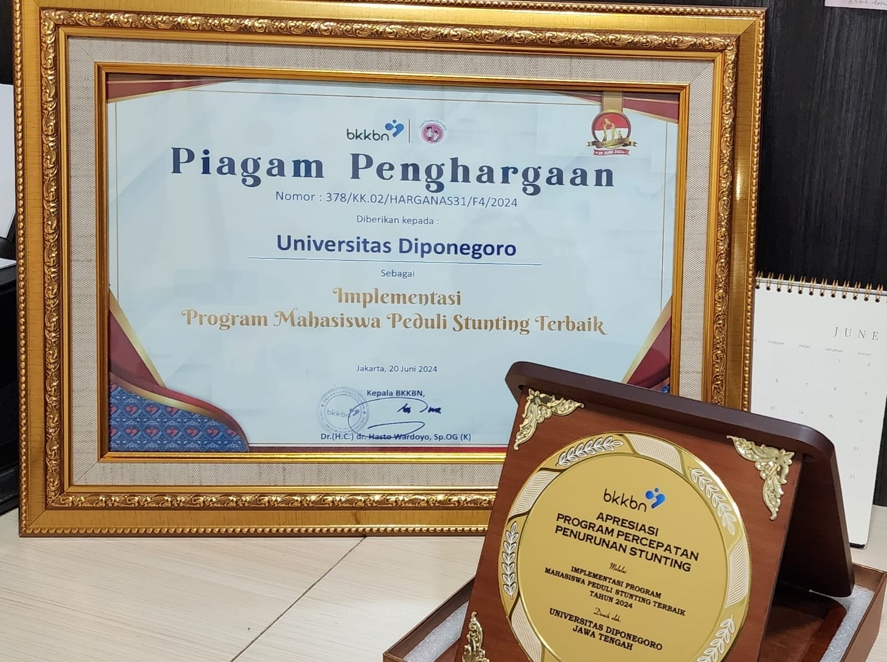The Managing Agency of Off-Campus Study Programs (LPPSDKU) of Diponegoro University, along with the President Director of Perum Bulog Pusat Jakarta, Prof. Dr. Ir. Y. Bayu Krisnamurthi, M.S., successfully delivered a hybrid public lecture on “Challenges for Future Food Stability” at the Entrepreneurship Building, 4th Floor, Faculty of Economics and Business, Undip Tembalang campus, Semarang (05/03). The public lecture was attended by 340 students from various faculties at Undip. Participants also joined online via the Zoom meeting platform, including those from Undip’s Off-Campus Study Programs (PSDKU) in Pekalongan, Batang, and Rembang regencies.
This activity aims to enhance students’ understanding of food and refresh them on related study processes so they can better prepare to face the increasingly competitive globalization and job market.
Prof. Dr. Ir. Bambang Waluyo Hadi Eko Prasetiyono, M.S., M.Agr., IPU, as the Chairperson of the Managing Agency of Off-Campus Study Programs (LPPSDKU) of Undip, expressed that the presented material was exceptionally trendy as food issues are crucial nowadays. Conflicts related to food occur frequently in countries worldwide. Thus, it is expected that students are well-informed about food issues, especially at the national level.
Meanwhile, in his speech, Prof. Dr. Suharnomo, S.E., M.Si., Vice Rector I for Academic and Student Affairs, expressed his gratitude to Prof. Dr. Ir. Y. Bayu Krisnamurthi, M.S., and the Bulog team for their participation in the event. He mentioned that the theme discussed is significant and extraordinary for providing insights into the food world. The University warmly welcomes initiatives from LPPSDKU, Prof. Bambang, who has many relations and contributes significantly.
“In the future, we will continue to provide many insights, support, recommendations, and clearer and more genuine perspectives. The campus must be the best place for scholarly dialectics. Therefore, InsyaAllah, Undip will contribute even more to society directly in the future. We have discussed many program designs with Prof. Bambang to establish Centers of Excellence in Batang and Jepara,” said Prof. Suharnomo.
“We should feel ashamed because Central Java always ranks first in poverty, and Undip is located there. Hopefully, in the future, we will truly contribute by design and by our system to reduce poverty levels with real work. We have remarkable expert figures and remarkable scientific products that have been mostly confined to laboratories rather than in mass production. Hopefully, with cooperation with Cimory, Bulog, and many other institutions, we can execute more effectively so Undip can benefit the surrounding community,” he added.
“Based on the World Economic Forum, the future belongs to four sectors: business, IT, renewable energy, and Food and Science Technology. Mastering food with science and technology is mastering the world. Therefore, insights, perspectives, and the big picture about the future must be aligned with global trends in agricultural and animal sciences with a touch of food and science technology,” Prof. Suharnomo concluded in his address.
During the lecture session, Prof. Dr. Ir. Y. Bayu Krisnamurthi, M.S. mentioned that specifically for students, Perum Bulog supports the development of Undip students’ thoughts and creative ideas by providing financial support for completing undergraduate theses and master’s theses in various fields of study through scholarships for 10 undergraduate theses worth Rp 5 million each and 5 master’s theses worth Rp 8 million each. This cooperation continues the existing Memorandum of Understanding between Bulog and Undip. Thus, the scholarships can be directly provided to the respective students by Bulog after receiving recommendations from Undip regarding the names of students receiving support for completing their theses.
The education scholarships are intended for students with topics for undergraduate theses and master’s theses, including but not limited to Analysis of Community / Consumer Perceptions of Bulog Products; Increasing Efficiency and Quality of Food Product Storage and Handling in Bulog Warehouses; Analysis of the Effectiveness of Food Assistance and SPHP Rice against Rice Price Stability; Perspective of Beneficiary Families (KPM); Generation-Z Perspective on Food Agriculture and Strategies to Encourage Farmer Regeneration; Agricultural Digitalization to Increase Productivity of Rice Farming Businesses and Improve Efficiency and Quality of Rice Milling.
A brief introduction to Bulog and its tasks according to Article 33 (2) of the 1945 Constitution is stated as “Important production branches for the country and which control the livelihoods of many people are controlled by the state,” and one of its forms is the existence of Bulog. Three normative tasks assigned to Bulog are availability, accessibility, and stability. “When combined, Bulog functions as a food supply chain manager, service provider, and public service obligation implementer carried out with government tasks and business development,” he explained.
Bulog invites Undip alumni to join Bulog and strive to become an excellent and trustworthy food company that supports food sovereignty in accordance with its vision and mission. Bulog currently has 26 regional offices with 133 branches, 1355 warehouses (with a capacity of more than 3 million tons), 133 processing units, and a total of 4232 employees.
Many people need to be made aware that Bulog has developed its main products significantly. Its primary form is rice, including processed forms such as sago. Now, sago is drawing attention and being sought after by many retail, individual, and market sectors because of the Stability of Supply and Price of Food (SPHP) rice. Bulog has distributed various types of rice as food aid to 22 million beneficiary families free of charge.
Additionally, Bulog innovates with fortified rice, a product fortified with Vitamins A, B1, B3, and others. This product combines domestic superior rice with fortified kernels to enhance its nutritional content. The product targets individuals who want to adopt or are adopting a healthy lifestyle.
Prof. Bayu explained that rice consumption across Indonesia is approximately 2.49 million tons per month, and it should be noted that around 26 million people are classified as poor, meaning they expect affordable prices. It should be noticed that each household consumes an average of 10 kg of rice every half month. The average rice consumption does not include those consuming rice in large quantities, such as restaurants, hotels, catering services, hospitals, and boarding schools, with large purchases. Additionally, there are more than 200,000 rice retailers, shops, stores, and retail stores, with 69% being small-scale businesses. These stores are supplied by approximately 170,000 small-scale rice mills, with 97% being small-scale and resupplied by approximately 23.7% of rice farmers, with 98% being small-scale.
“So, this is a series of people’s efforts as a whole, but Bulog has only captured 8% of the market share in the last 5-6 years on average. Bulog is the single giant entity, the single most prominent actor in the rice market share. Bulog never intends to dominate the market share because the essence of the government’s role, especially state-owned enterprises, is to be present when the people are unable or inefficient to do so. Together, we can increase food sovereignty: No Farmers, No Food, No Future,” explained Prof. Bayu. (DHW-Public Relations)
